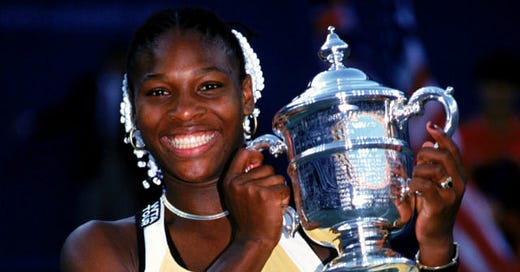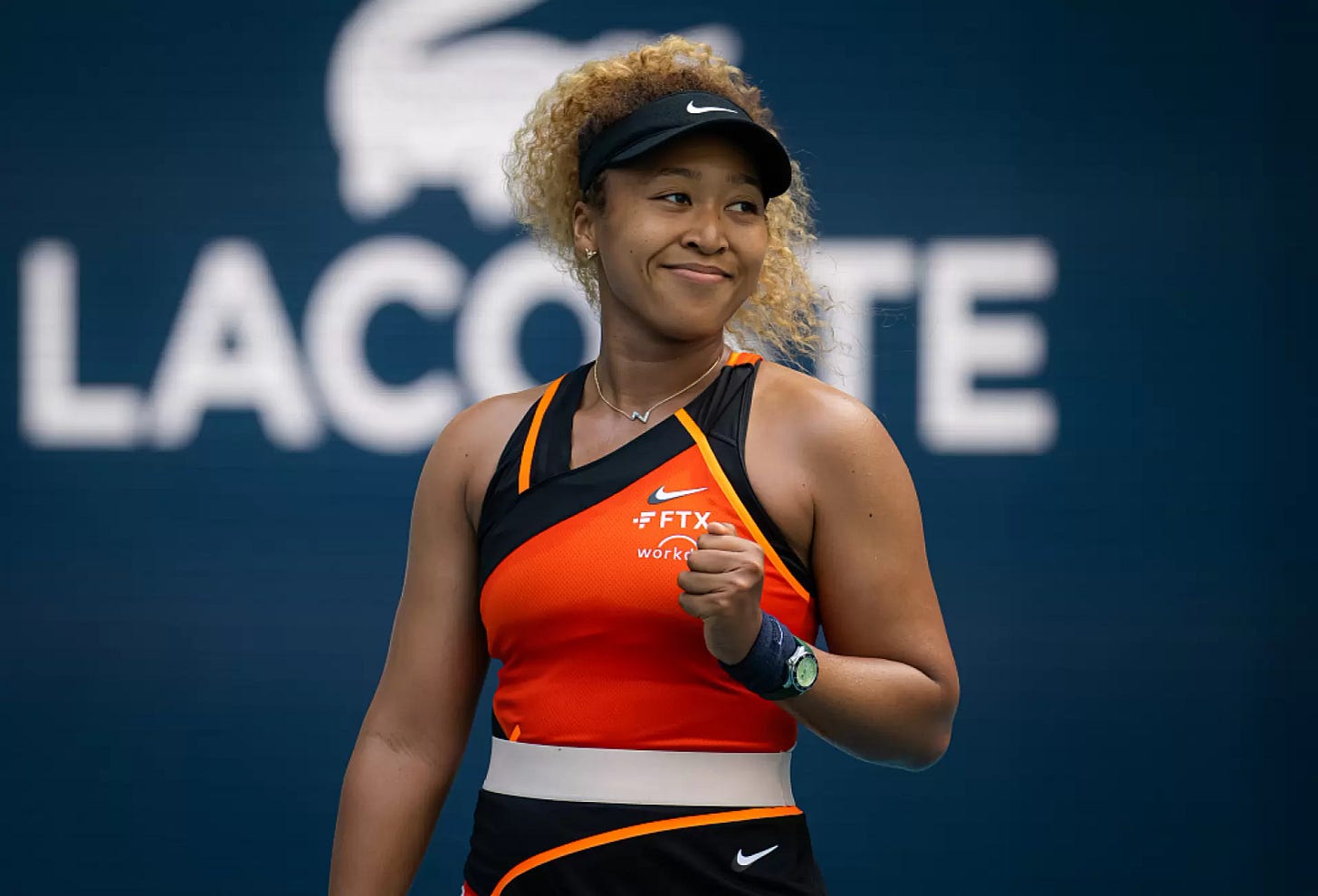On the eve of the prestigious U.S open where Serena Williams is poised to take her final bow as a professional tennis player I wanted to reflect on her journey as an athlete, as a tennis player, and most importantly as a black woman and how her journey did so much to embolden mine
On the day that Serena announced that she would be “evolving” from the sport of tennis I was overcome with emotion. It wasn't that the announcement was a shock. At the age of 40 Serena has been dazzling the world with her skills on the tennis court for over 2 decades, she has been through many highs and lows. As the elder statesman among the tour it's very much seen as a natural progression to see her finally close this chapter in her life. What caused me to overflow with emotion for the better part of an hour that fateful day after reading and re-reading her beautifully penned Vogue article was the fact that she had been for me the building blocks of my identity.
As a young black girl growing up in a small town in Canada I was constantly searching for belonging. Though I had close relationships with my family it was hard to be comfortable in my skin and my identity as a black person. It was something I battled with for many years since I could utter my first words. Around me, very few people looked like me or shared any similar traits. It made me feel so alien, so wrong, all I wanted to be was normal and to me black wasn’t normal, not one bit.
One of my favourite things to do with my family as far back as I can remember was to sit down in the living room, gather around the tv and watch sports. My parents were avid sports fans, hockey, soccer, basketball you name it would be on our television screens. I never found myself quite interested until they would turn the tv on to tennis. I was transfixed by those bright yellow balls, the way these blazing fast athletes would take complete command of the rectangular court. But nobody else had me quite as transfixed as Serena did. She was the first player I could recall by name. Anytime tennis would come on I would loudly bombard my parents with questions as to when she would make her arrival. The only person that could keep me seated on our living room couch for hours on end, despite all my bountiful energy was Serena. Finally, I found someone who looked like me, not only that but they didn’t shrink or hide from their blackness, they thrived in it. I saw a confident black woman who was so openly herself and continued to reap the rewards of all of her success.

Through the years as I grew older and continued to watch Serena she only became more inspiring to me.
Tennis, a sport that was played in some capacity from as early as the 12 century has always prided itself on being insular and exclusive. It was a sport for the kings and the Aristocats. When lawn tennis was born and became popular in England the sport became associated with money and privilege. To play tennis you needed to have the money to pay for the equipment to support the exorbitant costs of lessons. Not only that but you often had to be a member of a country club to even have the opportunity to play (many of which were white only). Tennis’s doors being shut were the basis of the sports DNA. It wasn’t until Althea Gibson that those barriers were finally breached. After intense lobbying, she was the first black player to participate in a grand slam and not only did she play, she won 11 Grand slam titles in both singles and doubles. She paved the way for the likes of so many black athletes and is often cited as an inspiration for both Serena and Venus.
Though Gibson helped to open the door, from 1957 to 1990 not a single woman of colour made the finals of a grand slam again. Gibson had been able to kick the door down and she was able to do great things when she was let in but this was still a sport that was resistant to change. During that long drought, two little girls named Serena and Venus Williams were born (in 1980 and 1981 respectively). The girls grew up in a small two-bedroom townhome, in the heart of Compton, California, considered one of the most crime-ridden areas of the United States. What is remarkable about their story is that greatness wasn’t born in a top-tier academy or a tennis dynasty, they were not moulded with the help of thousands of dollars and the best equipment. They were at the hands of two self-taught parents, who wrote their own manual. Serena and Venus were thrust onto the court at the tender age of four and five with a promise and a dream that they were destined for the grandest of stages and that they were, “going to shake up this world”. It was no easy feat of course with a father that worked around the clock to support the entire household of seven--in addition to being their coach and teacher--and a mother who often stitched their sportswear and tennis kits by hand. Like me, they didn’t grow up in a household that had the most, like me their parents had to make a lot of sacrifices for them just to see their children succeed.
Even as Serena made her entrance into the world of pro tennis and quickly rose up the rankings, her journey was riddled with pitfalls. There was constant chatter, about her body, her muscles, her hair, her demeanour on the court, about what she said in interviews and what she didn’t say in interviews. And of course the racism she dealt with was never too far away. One of the most famous incidents was what happened in Indian Wells in 2001 where she and Venus were booed and jeered at by the crowd mercilessly due to the conspiracy theory running rampant that they were fixing matches. Serena later told the press that day after the final against Kim Clijsters was completed that the crowd chanted, “I wish it was 75, we’d skin you alive”. The sisters decided to boycott the tournament for the next fourteen years.
She steered past every one of those hardships with more wins, more wins and more wins. All the way to 23 grand slams. And it wasn’t just her undeniable talent or skill that accompanied her through the climb and won her so many adoring fans. It was her effervescent smile, her charm, her wit. It was her willingness to be real, to always stand up for herself and what was right. As we watched her grow up under the harsh glare of the spotlight, from teen to young woman, to a mother, to a wife she commanded every path she walked down
As I look back on all these years with her lighting up my television, I would be remiss not to reflect on the lessons she taught me and the lessons that will stay with me for the rest of my life. She taught me that there isn’t one pathway to success. She taught me to lead with heart, drive and passion. She taught me to be confident even in the face of so much doubt, she taught me to love who I am, to love where I come from despite it not fitting into the picture-perfect ideal, and most importantly she taught me my skin colour was not something to be afraid or ashamed of. Being black was beautiful, being black was more than enough.
Just like her idol Althea Gibson, she will be leaving the tennis world a much better place than she found it, having inspired so many generations of tennis fans all around the world, so many of whom like Naomi Osaka, Coco Guaff, and Madison Keys who are following in her footsteps who were able to walk down the path she paved. Though I have faith that Serena won’t leave the tennis world for too long I look forward to what she has in store for us next and the next mountain she will conquer. I can truly say I would not be the person I am today without her and I am so grateful for what she has done for the spot and what she has done for me.






